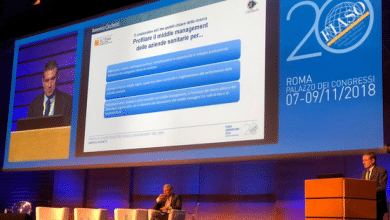
Lorenzin, in the referendum yes makes the difference also in Healthcare
 "On the possibility of offering treatment and assistance in a universal way to all citizens, yes to the referendum makes the difference". This was stated by the Minister of Health, Beatrice Lorenzin, in her speech on the occasion of the opening ceremony of the 18th Congress of the Italian Association of Medical Oncology (Aiom), underway in Rome. "There is much talk of a referendum" he added "but nobody talks about how much it would change for health care because this constitutional reform finally puts its hand to Title V and brings back homogeneity in health interventions". All health regulations revert to the state.
"On the possibility of offering treatment and assistance in a universal way to all citizens, yes to the referendum makes the difference". This was stated by the Minister of Health, Beatrice Lorenzin, in her speech on the occasion of the opening ceremony of the 18th Congress of the Italian Association of Medical Oncology (Aiom), underway in Rome. "There is much talk of a referendum" he added "but nobody talks about how much it would change for health care because this constitutional reform finally puts its hand to Title V and brings back homogeneity in health interventions". All health regulations revert to the state.
«Just to give a few examples» continued Lorenzin «let's take the pharmaceutical handbook, and therefore access to medicines, which today changes from region to region. Let's take the diagnostic-therapeutic plans, which should be uniform while today there are too many different times for a mammogram to be performed between one region and another. The same thing happens for diabetes, where even in the same region, the individual local health authorities treat you differently. Even for cancer, regardless of centers of excellence and professionals, still getting sick in one area compared to another makes a difference. This must be changed, it is a fact of civilization.
It's time to finally put a hand in an orderly way to all these dysfunctions born from the previous reform of Title V".
The reform which, in 2001, had led to an increase in regional powers in the field of health, specifies the minister, "was not born with bad intentions but had serious consequences on the right to health". The constitutional reform which will be voted on on Sunday 4 December, intervenes on this aspect by modifying article 117 of title V. «We have been patching up for years» concludes Lorenzin «. And we cannot always put patches, it is time to intervene in an organic way, as foreseen by the constitutional reform to which we are called".
Healthcare, 'with the Yes oncological drugs in all Regions'? Renzi, don't deceive the sick
It takes a lot of chutzpah to go on TV like he did Matthew Renzi to say about constitutional reform "with the referendum it is decided whether to leave all health care to the Regions or to give the same rights to all citizens" or to say, cynically exploiting people's suffering, "if the yes wins all cancer patients will have the same drugs regardless of the region in which they live”.
L and Regions that in these delusional statements make the figure of a junkyard they are silent starting from their representative Stefano Bonaccini who didn't even bother to pretend to defend the institution. Not that they don't have responsibilities, actually they've done a lot of Cossacks but please there is a limit to everything.
and Regions that in these delusional statements make the figure of a junkyard they are silent starting from their representative Stefano Bonaccini who didn't even bother to pretend to defend the institution. Not that they don't have responsibilities, actually they've done a lot of Cossacks but please there is a limit to everything.
Dear President, the rights of citizens to be in good health and the medicines to be given to cancer patients first of all they depend on how much money the government decides to give to the Regions. Since you've been in government, you've set up a system that aims at to decrease public health and then privatize it at a later time, based on its progressive definancing. If he continues to definance health care, that is, to give less and less money to the Regions, the rights you speak of will be denied even more. But for this, dear President, you can't blame the Regions which, once again this year, are asking you for more money for the national health fund and to cover essential levels of care. I remind you that cancer drugs fall within these levels and that as they have recently been redefined by your Ministry of Health, they cost about 3 billion but she for this thing decided to allocate only 800 million.
Mr President, you cannot afford to deceive the Italians with your "bischerate": the title V to which you refer with respect to the constitutional reform it has been modified in such a marginal and generic way and only with a view to reducing the disputes linked between institutions but without solving the serious problem of health governance which I remind you in the end is at the origin of a large part of the problems that your government defines Of sustainability.
But this is not accidental. Title V, as you well know, was altogether emptied in the sense that for years neither the Ministry of Health nor the Regions and least of all the companies have commanded health spending. But only you are in charge, Mr. President, in line with your super minister of the economy. Thanks to her we passed by spending reviews at the spending power.
Doesn't the acronym “GSA” mean anything to you? It means “centralised health management” a management which for years has been centralized in the Ministry of the Economy and which decides everything that has financial implications: balances, deficits, receiverships, repayment plans, cuts in needs, compatibility, limitations, blockages, ceilings. In this favored by a facade Minister of Health who for how many  stupid face is politically invulnerable but only because it falls within what for Renzi is a utility and which Lenin, not me, defined as "useful idiots" referring to the West.
stupid face is politically invulnerable but only because it falls within what for Renzi is a utility and which Lenin, not me, defined as "useful idiots" referring to the West.
You are the president of "zero cost" that is, everything that should be done in health care should not cost anything, so it blocked everything: contracts, turnover, purchases, hiring. And at no cost you can't cure cancer or other diseases.
And then president, let me say it but you who for fear of losing the referendum promise equality, universalism, justice, but you know that at least 13 Regions out of 21 are selling off their patients because do not know how to cure them? They mainly sell them off to four northern regions (Lombardy, Emilia Romagna, Tuscany, Veneto) who are happy to welcome them otherwise, short of money as they are, they would go into deficit. Did you know that the turnover of this shame is around 4 billion and that the sick market concerns around 9oo.ooo people every year?
Your de-financing policies dear President are splitting Italy into a thousand parts much more than the failed federalism, increasing inequalities and injustices. What has your government done to help the Regions weaker to be self-sufficient, that is, not to sell off one's malts? I tell him. He harassed them because they didn't respect the budget limits, he imposed repayment plans on them, he had them taxed and then he put them in commission by massacring democracy. That is, it has impoverished them more than they already were. But in no case has he thought of refinancing them, of making them self-sufficient, of helping them to overcome their historical handicaps even by imposing precise conditions of morality and competence on them.
And now that it gets closer the hour of truth does it allow itself to speculate on the desperation of cancer patients by telling them to vote yes because this way they will get the drugs? Ignoble. Simply vile.
Of Ivan Cavicchi | October 6, 2016 | Daily fact
Related news: Budget law, a billion pre-election tip for health care
Maneuver 2017, measures on health: redefined the ceilings for pharmaceuticals
With the manoeuvre, at least another 20% of hospitals will be included in the repayment plan.
Pharmaceutical expense. Aifa notes and one-way rigor
________________________________________
The legislative power is exercised by the State [70 and following.] and by the Regions in compliance with the Constitution, as well as with the constraints deriving from the Community legal system and international obligations.
The state has exclusive legislation in the following matters:
a) foreign policy and international relations of the state; State relations with the European Union; right of asylum and legal status of citizens of states not belonging to the European Union;
b) immigration;
c) relations between the Republic and religious denominations;
d) Defense and Armed Forces; state security; weapons, ammunition and explosives;
e) currency, protection of savings and financial markets; protection of competition; currency system; state tax and accounting system; harmonization of public budgets; equalization of financial resources;
f) state bodies and related electoral laws; state referenda; election of the European Parliament;
g) legal order and administrative organization of the State and national public bodies;
h) public order and security, with the exception of the local administrative police;
i) citizenship, marital status and registry office;
l) jurisdiction and procedural rules; civil and criminal law; administrative justice;
m) determination of the essential levels of services concerning civil and social rights which must be guaranteed throughout the national territory;
n) general rules on education;
o) social security;
p) electoral legislation, governing bodies and fundamental functions of municipalities, provinces and metropolitan cities;
q) customs, protection of national borders and international prophylaxis;
r) weights, measures and determination of time; statistical information and IT coordination of state, regional and local administration data; intellectual works;
s) protection of the environment, ecosystem and cultural heritage.
Matters of concurrent legislation are those relating to: international relations and relations with the European Union of the Regions; foreign trade; job protection and safety; education, without prejudice to the autonomy of educational institutions and with the exclusion of education and professional training; professions; scientific and technological research and support for innovation for productive sectors; health protection; diet; sports organization; civil protection; territorial government; civil ports and airports; large transport and shipping networks; sorting of communication; production, transport and national distribution of energy; complementary and supplementary social security; coordination of public finance and the tax system; enhancement of cultural and environmental assets and promotion and organization of cultural activities; savings banks, rural banks, regional credit institutions; regional land and agricultural credit institutions. In matters of concurrent legislation, the legislative power belongs to the Regions, except for the determination of the fundamental principles, which is reserved for the legislation of the State.
The Regions have the legislative power in reference to any matter not expressly reserved to the legislation of the State.
The Regions and Autonomous Provinces of Trento and Bolzano, in matters within their competence, participate in the decisions aimed at the formation of Community legislative acts and see to the implementation and execution of international agreements and European Union acts, in compliance of the procedural rules established by the law of the State, which governs the methods of exercising the substitutive power in the event of default.
Regulatory power belongs to the State in matters of exclusive legislation, unless delegated to the Regions.
Regulatory power belongs to the Regions in all other matters.
The Municipalities, Provinces and Metropolitan Cities have regulatory powers regarding the organization and performance of the functions assigned to them.
The regional laws remove any obstacle that prevents the full equality of men and women in social, cultural and economic life and promote equal access for women and men to elected offices [3].
The regional law ratifies the agreements of the Region with other Regions for the better exercise of its functions, also with the identification of common bodies.
In matters within its competence, the Region can conclude agreements with States and understandings with internal territorial bodies of another State, in the cases and with the forms governed by the laws of the State.
Article 117 (reformed – changes in bold)
Legislative power is exercised by the State and the Regions in compliance with the Constitution, as well as with the constraints deriving from the European Union legal system and international obligations.
The state has exclusive legislation in the following matters:
- foreign policy and international relations of the state; State relations with the European Union; right of asylum and legal status of citizens of states not belonging to the European Union;
- immigration;
- relations between the Republic and religious denominations;
- Defense and Armed Forces; state security; weapons, ammunition and explosives;
- currency, protection of savings and financial markets and insurance; protection and promotion of the competition; currency system; state tax and accounting system; harmonization of public budgets; coordination of public finance and the tax system; equalization of financial resources;
- state bodies and related electoral laws; state referenda; election of the European Parliament;
- regulation and administrative organization of the State and national public bodies; rules on the administrative procedure and on the legal discipline of work employed by public administrations aimed at ensuring its uniformity on the national territory;
- public order and security, with the exception of the local administrative police;
- citizenship, marital status and registry office;
- jurisdiction and procedural rules; civil and criminal law; administrative justice;
- determination of the essential levels of services concerning civil and social rights which must be guaranteed throughout the national territory; general and common provisions for the protection of health, for social policies and for food security;
- provisions general and common on education; school system; university education and strategic planning of scientific and technological research;
- social Security, including complementary and supplementary social security; job protection and safety; active labor policies; general and common provisions on vocational education and training;
- sorting, electoral legislation, governing bodies and fundamental functions of Municipalities and Metropolitan Cities; provisions of principle on the associative forms of the municipalities;
- customs, protection of national borders and international prophylaxis; foreign trade;
- weights, measures and determination of time; coordination of statistical information and data processing, processes and related IT infrastructures and platforms of the state, regional and local administration; intellectual works;
- protection and enhancement cultural and landscape assets; environment and ecosystem; sports organization; general and common provisions on cultural activities and tourism;
- organization of professions and communication;
- general and common provisions on territorial governance; national system and coordination of civil protection;
- national production, transport and distribution of energy;
- strategic infrastructures and major transport and navigation networks of national interest and related safety standards; civil ports and airports of national and international interest.
Legislative power belongs to the Regions in the field of representation of linguistic minorities, planning of the regional territory and mobility within it, infrastructural endowment, programming e organization of health and social services, the promotion of local economic development and the organization of business services and vocational training at the regional level; without prejudice to the autonomy of scholastic institutions, in matters of scholastic services, the promotion of the right to study, including at university level; on the subject of regulation, as far as regional interest is concerned, of cultural activities, the promotion of environmental, cultural and landscape assets, the enhancement and regional organization of tourism, the regulation, on the basis of specific agreements concluded at regional level, of the financial relations between the territorial bodies of the Region for compliance with the regional and local public finance programmatic objectives, as well as in any matter not expressly reserved for exclusive jurisdiction of the state.
Upon proposal of the Government, the law of the State can intervene in matters not reserved to exclusive legislation when the protection of the juridical or economic unity of the Republic requires it, or the protection of the national interest.
The Regions and Autonomous Provinces of Trento and Bolzano, in matters within their competence, participate in decisions aimed at the formation of European Union regulatory acts and ensure the implementation and execution of international agreements and of the acts of the European Union, in compliance with the procedural rules established by the State law, which regulates the methods of exercising the substitutive power in the event of default.
Regulatory power belongs to the State and the Regions according to their respective legislative competences. The faculty of the State to delegate is reserved to the Regions the exercise of this power in matters of exclusive legislative competence. Municipalities and metropolitan cities have the power to regulate the organization and performance of the functions assigned to them, in compliance with state or regional law.
Regional laws remove all obstacles that prevent full equality of men and women in social, cultural and economic life and promote equal access for women and men to elected offices.
The regional law ratifies the agreements of the Region with other Regions for the better exercise of its functions, also with the identification of common bodies.
In matters within its competence, the Region can conclude agreements with States and understandings with internal territorial bodies of another State, in the cases and with the forms governed by the laws of the State.





